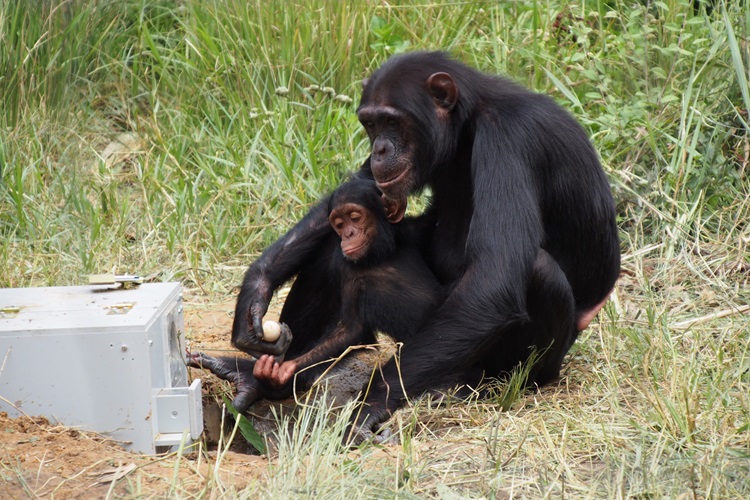Do as I do: chimpanzees may use social learning to acquire new skills
 Chimpanzees may learn a new skill from observing each other, according to collaborative research from the University of St Andrews and the Max Planck Institute for Evolutionary Anthropology.
Chimpanzees may learn a new skill from observing each other, according to collaborative research from the University of St Andrews and the Max Planck Institute for Evolutionary Anthropology.
A study published this week (Wednesday 6 March) in Nature Human Behaviour reports that chimpanzees have the capacity to learn from others’ solutions to a task that they are unlikely to invent on their own. This is one of the aspects required to develop cumulative cultural evolution, which has previously been claimed to be a uniquely human characteristic.
A theory known as the zone of latent solutions (ZLS) hypothesis states that culture in great apes develops when multiple individuals in a group independently re-innovate cultural behaviours. Evidence for this comes from observations of captive apes independently developing known cultural behaviours, such as nut-cracking.
To assess chimpanzees’ capacity for cumulative culture and social learning, the international team of researchers, including Professor Josep Call from the School of Psychology and Neuroscience at the University of St Andrews, worked with 66 sanctuary-dwelling chimpanzees in Zambia, who are housed in two separate groups.
The chimpanzees were given a puzzle box that required several steps to open to gain a food reward:
- A wooden ball needed to be retrieved from the forest
- A drawer in the apparatus needed to be pulled out and kept protruded
- The ball needed to be inserted into the pulled-out drawer
- The drawer had to be pushed back into the apparatus to release the reward
As chimpanzees are naturally intelligent and inventive, they were first left with the puzzle box for three months in order to assess whether they would develop a solution themselves. In this instance, the chimpanzees did not work out how to open the box themselves.
The authors then trained one chimpanzee from each group to open the box, then observed whether the other chimpanzees subsequently developed this skill after watching the ‘trainer’ open the box at least nine times up to 1.5 metres away. Over the following three months, 14 of the 66 chimpanzees across both groups developed the ability to open the box.
The authors note that aspects of the skills needed to complete the task may differ between individuals and suggest that future work is needed with different techniques to test the range of chimpanzee cognitive and copying abilities.
Commenting on the study, Professor Call said: “Our study shows that social learning can extend the capabilities of chimpanzees beyond the solutions that they can invent on their own when facing a novel task.”
Category Research